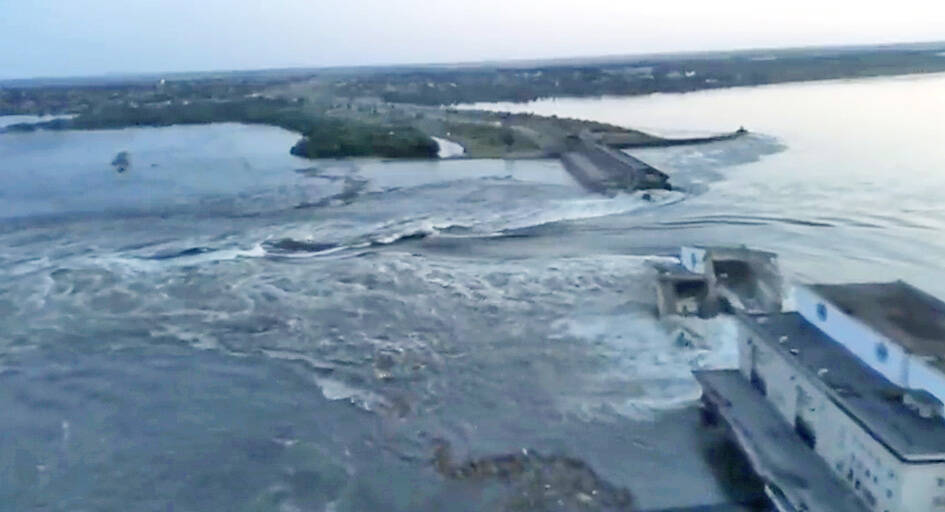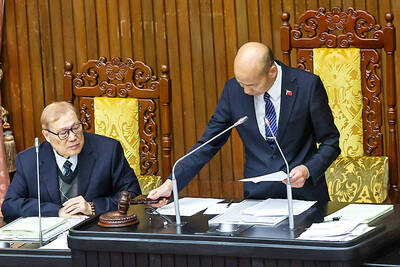The wall of a major dam in southern Ukraine collapsed yesterday, triggering floods, endangering Europe’s largest nuclear power plant and threatening drinking water supplies, as both sides in the war scrambled to evacuate residents and blamed each other for the destruction.
Ukraine accused Russian forces of blowing up the Kakhovka dam and hydroelectric power station on the Dnieper River in an area that Moscow controls, while Russian officials blamed Ukrainian bombardment in the contested area. It was not possible to verify the claims.
The potentially far-reaching environmental and social consequences of the disaster quickly became clear as homes, streets and businesses flooded downstream and emergency crews began evacuations; officials raced to check cooling systems at the Zaporizhzhia Nuclear Power Plant; and authorities expressed concern about supplies of drinking water to the south in Crimea, which Russia illegally annexed in 2014.

Photo: AP
Russian and Ukrainian authorities brought in trains and buses for residents. About 22,000 people live in areas at risk of flooding in Russian-controlled areas, while 16,000 live in the most critical zone in Ukrainian-held territory, according to official tallies. Neither side reported any deaths or injuries.
The dam break added a stunning new dimension to Russia’s war in Ukraine, now in its 16th month. Ukrainian forces were widely seen to be moving forward with a long-anticipated counteroffensive in patches along more than 1,000km of front line in the east and south.
It was not immediately clear whether either side benefits from the damage to the dam, since both Russian-controlled and Ukrainian-held lands are at risk. The damage could also hinder Ukraine’s counteroffensive in the south and distract its government, while Russia depends on the dam to supply water to Crimea.
Amid official outrage, Ukrainian President Volodymyr Zelenskiy said he convened an urgent meeting of the National Security Council. He alleged Russian forces set off a blast inside the dam structure at 2:50am and said about 80 settlements were in danger.
Zelenskiy said in October last year his government had information that Russia had mined the dam and power plant.
However, Kremlin spokesman Dmitry Peskov called it “a deliberate act of sabotage by the Ukrainian side … aimed at cutting water supplies to Crimea.”
Both sides warned of a looming environmental disaster. Ukraine’s Presidential Office said about 150 tonnes of oil escaped from the dam. Ukraine’s nuclear operator Energoatom said via Telegram that the damage to the dam “could have negative consequences” for the Zaporizhzhia Nuclear Power Plant, which is Europe’s biggest, but wrote that for now the situation is “controllable.”
The International Atomic Energy Agency said there was “no immediate risk to the safety of the plant.”

DEFENDING DEMOCRACY: Taiwan shares the same values as those that fought in WWII, and nations must unite to halt the expansion of a new authoritarian bloc, Lai said The government yesterday held a commemoration ceremony for Victory in Europe (V-E) Day, joining the rest of the world for the first time to mark the anniversary of the end of World War II in Europe. Taiwan honoring V-E Day signifies “our growing connections with the international community,” President William Lai (賴清德) said at a reception in Taipei on the 80th anniversary of V-E Day. One of the major lessons of World War II is that “authoritarianism and aggression lead only to slaughter, tragedy and greater inequality,” Lai said. Even more importantly, the war also taught people that “those who cherish peace cannot

STEADFAST FRIEND: The bills encourage increased Taiwan-US engagement and address China’s distortion of UN Resolution 2758 to isolate Taiwan internationally The Presidential Office yesterday thanked the US House of Representatives for unanimously passing two Taiwan-related bills highlighting its solid support for Taiwan’s democracy and global participation, and for deepening bilateral relations. One of the bills, the Taiwan Assurance Implementation Act, requires the US Department of State to periodically review its guidelines for engagement with Taiwan, and report to the US Congress on the guidelines and plans to lift self-imposed limitations on US-Taiwan engagement. The other bill is the Taiwan International Solidarity Act, which clarifies that UN Resolution 2758 does not address the issue of the representation of Taiwan or its people in

The Philippines yesterday criticized a “high-risk” maneuver by a Chinese vessel near the disputed Scarborough Shoal (Huangyan Island, 黃岩島) in a rare incident involving warships from the two navies. The Scarborough Shoal — a triangular chain of reefs and rocks in the contested South China Sea — has been a flash point between the countries since China seized it from the Philippines in 2012. Taiwan also claims the shoal. Monday’s encounter took place approximately 11.8 nautical miles (22km) southeast” of the Scarborough Shoal, the Philippine military said, during ongoing US-Philippine military exercises that Beijing has criticized as destabilizing. “The Chinese frigate BN 554 was

LEISURE: The new law adds Confucius’ birthday, the anniversary of the Battle of Guningtou, Constitution Day and Little New Year as national holidays The Legislative Yuan yesterday passed new legislation adding four national holidays and making Workers’ Day a national holiday for all sectors. The Chinese Nationalist Party (KMT) and the Taiwan People’s Party used their combined majority in the legislature to push the jointly proposed draft through its third and final reading. This new law supersedes the existing regulations for the implementation of memorial days and state holidays, which are administered by the Ministry of the Interior. The new law recognizes Confucius’ birthday on Sept. 28, the anniversary of the Battle of Guningtou on Oct. 25, Constitution Day on Dec. 25 and “Little New Year,”